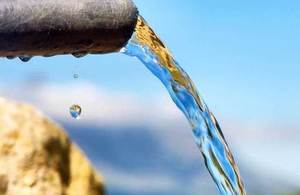Britain launches joint Israeli-Palestinian effort to tackle water and health issues
British government inaugurates two new platforms for rare scientific co-operation.

Britain launches joint Israeli-Palestinian effort to tackle water and health challenges
Israeli and Palestinian scientists will work together to tackle regional water and health challenges, in a unique effort announced today by the United Kingdom.
The British government’s Science and Innovation Network, together with the British Council Israel and research organisations in the region, is launching two new programmes for researchers and students. The new programmes were announced today in Tel Aviv, by the UK’s National Technology Adviser Liam Maxwell. The new schemes provide a rare opportunity for Israelis and Palestinians to work with top British experts on ways to solve serious water shortage and quality issues.
Prof. Robin Grimes, Chief Scientific Advisor of the Foreign and Commonwealth Office, which oversees the new programmes, said:
Today’s great scientific challenges take no heed of manmade borders. If we are to combat the challenges of today, we are going to need to do it together. In the Middle East and many other regions, there is great need for improved access and management of water. The UK is proud to be working with the very best scientists and entrepreneurs in the region to improve access to water. The benefits of this work will echo far beyond the region.
The Middle East and North Africa region, with an arid climate and growing population, is to benefit the most from better management of water resources. Regional scientific cooperation on this issue will enhance the development of solutions for some of the world’s most waterpoor societies. The UK is proud to be advancing research work on this issue.
The new programmes are:
STREAM - funds trilateral water research collaborations between scientists from the UK, Israel and the Middle East and North Africa. The researchers will undertake 10-18-month collaborative water research projects using experimental, natural and social science research for the benefit of some of the world’s most waterpoor societies. A pilot Call for Proposals led to the funding of five projects in the region last year. STREAM is now inviting bids for funding.
GROWTH (Graduate Research Opportunities in Water-Technology & Health) - is a Fellowship program for exceptional graduates of Palestinian universities to conduct their graduate studies at Israeli laboratories in the fields of water technology and health. Fellows attend events and conferences in the UK to build strong connections with British researchers. The scheme is run by the British Council and the Science and Innovation Network.
Prof. Menahem Ben-Sasson, President of the Hebrew University of Jerusalem, said of the GROWTH Fellowships:
As a leading academic and research institution, we are committed to advancing science for the benefit of all people. Through this new partnership with the British government, Palestinian graduate students are already contributing to world-leading research at the Hebrew University, and we are delighted to have them with us. This program not only advances science, but through it sends a message of hope and friendship, and of the importance of working together to find solutions that improve the health of our communities.
Lena Qawasmi, a GROWTH Fellow and graduate of Al Quds University in Jerusalem, said:
I’m so pleased to be working with British and Israeli scientists as part of the GROWTH Fellowships, along with my counterparts. This program provides access to knowledge, tools and skills, that we would otherwise not have had. I’m looking forward over the coming months to seeing the start of more partnerships like this.
The new programmes come on top of unprecedented UK-Israeli scientific cooperation, including the biggest bilateral science conference in April; launch of a suite of bilateral research programmes; and over 20 scientific visits with hundreds of scientists going back and forth, supported by the UK Israel Science Council.